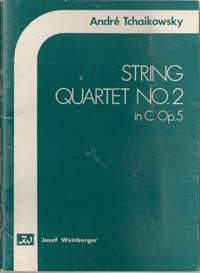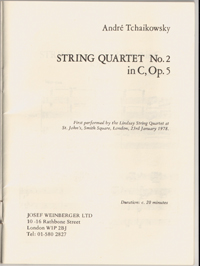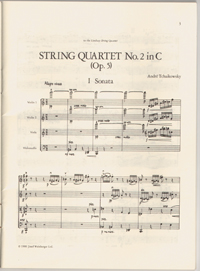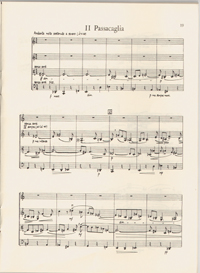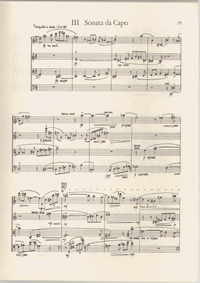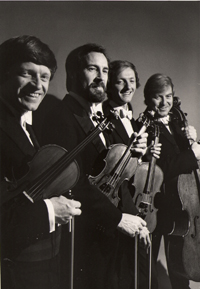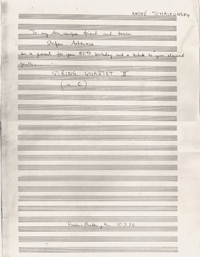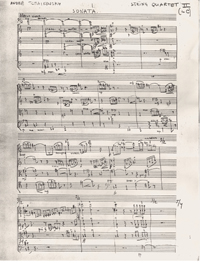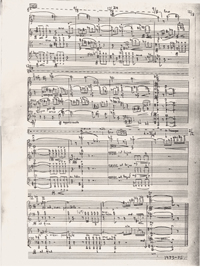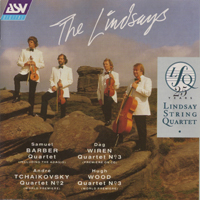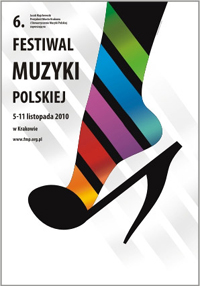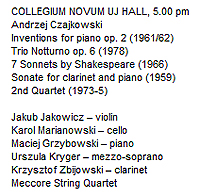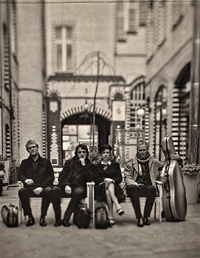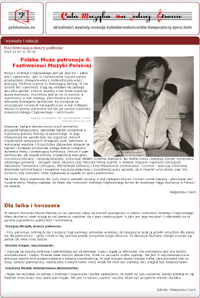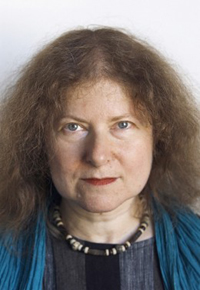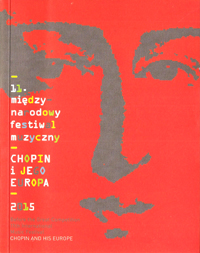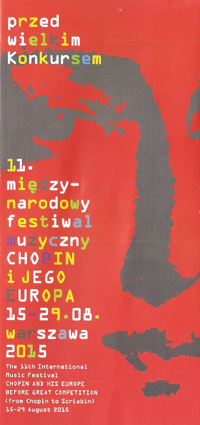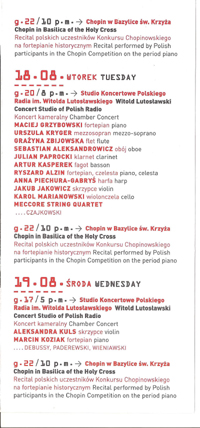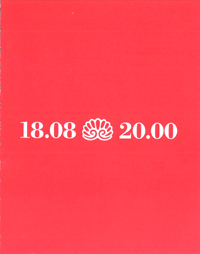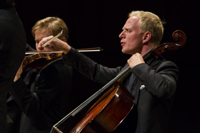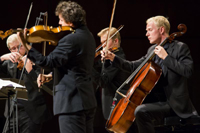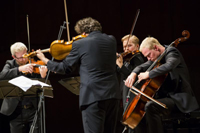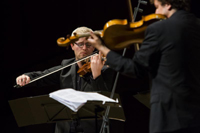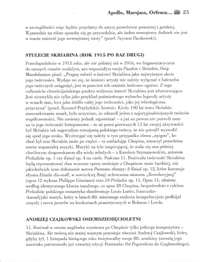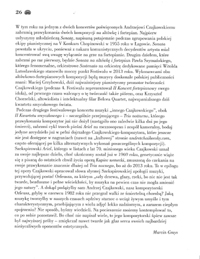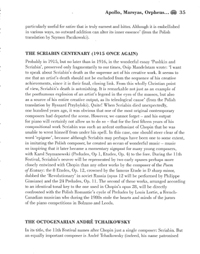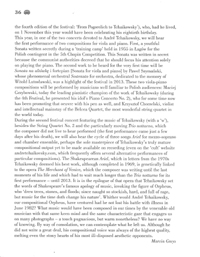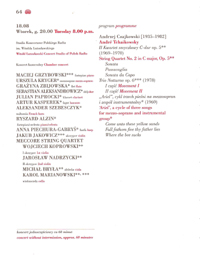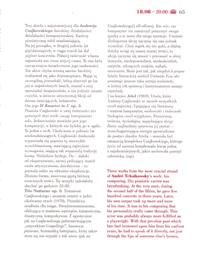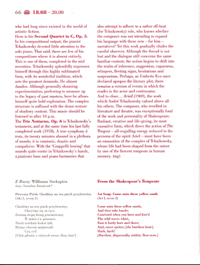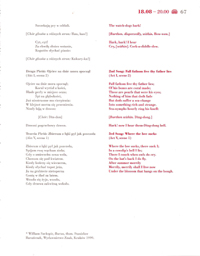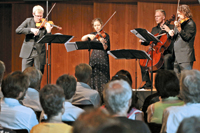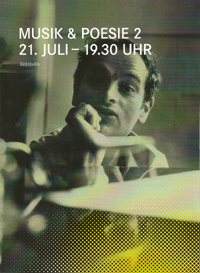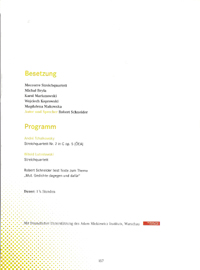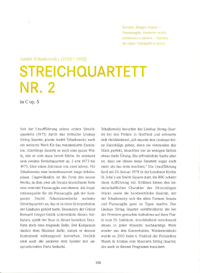|
String
Quartet No. 2 in C (1973-1975) - Opus 5
This
webpage provides information about the André Tchaikowsky String
Quartet No. 2 in C (1973-1975) - Opus 5. This includes music links and
then text that lists all known details regarding this composition from
the book, The Other Tchaikowsky - A Biographical Sketch of André
Tchaikowsky.
Here are
two brief audio clips of a radio program "A Study in Contrast"
about André Tchaikowsky and his string quartets. For the entire
BBC radio program, see the Miscellaneous link above. Voices for
the following: David Owen Norris, Peter Cropper
Lindsay
Quartet meets André / contrast_lindsay.mp3
Lindsay
Quartet mentions the quartets / contrast_quartets.mp3
(2015)
Friends of Music (Florence, Italy) / Meccorre String Quartet
The Friends of Music in Florence, Italy hosted a concert on December
6th, 2015 that featured the String Quartet No. 2 played by the Meccorre
String Quartet. The concert was held at the historic Teatro della Pergola.
Click
Here to read more (in Italian). The members of the quartet were:
Wojciech Koprowski – Violin
Jaroslaw Nadrzycki – Violin
Michal Bryla – Viola
Karol Marianowski – Cello
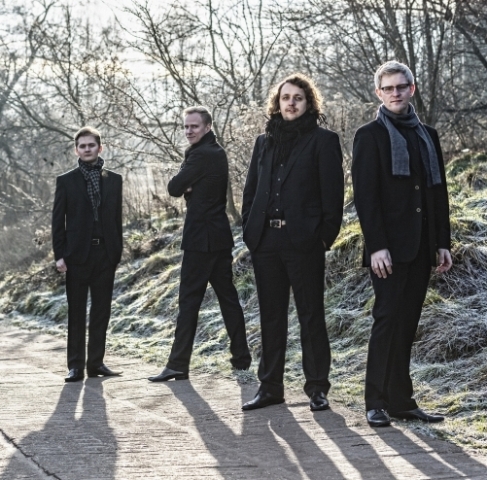
Meccorre String Quartet (Photo: A. Berbecki)
(2015)
Chopin and his Europe Music Festival / Meccorre String Quartet
The 2015
version of the excellent Chopin and his Europe Music Festival in Warsaw,
Poland included a stunning performance of the String Quartet No. 2 by
the Meccorre String Quartet. The members of the quartet were:
Wojciech Koprowski – Violin
Jaroslaw Nadrzycki – Violin
Michal Bryla – Viola
Karol Marianowski – Cello
See the
images below for scenes from the concert and pages from the program.
Almost immediately after this performance, the Meccorre String Quartet
headed to Belfast, N. Ireland for a repeat performance and other works.
Click
Here for more information regarding the Belfast concerts. Click
Here for a news article (in English).
Shortly
after this concert, the Meccorre played the 2nd String Quartet again
at St. Conal’s Church in Donegal, Ireland at part of the Casimir
Concerts season. Click
Here for additional information and Click
Here for the PDF program (page 12).
(2015)
Live Performance / Meccorre String Quartet
As part of the 2015 Q'arto
Mondi 6th International Chamber Music Festival, the Meccorre String
Quartet (website)
played the Andrzej Czajkowski String Quartet No. 2. The members of the
quartet were:
Wojciech Koprowski – Violin
Jaroslaw Nadrzycki – Violin
Michal Bryla – Viola
Karol Marianowski – Cello
This live
performance is now on Vimeo (Click
Here).
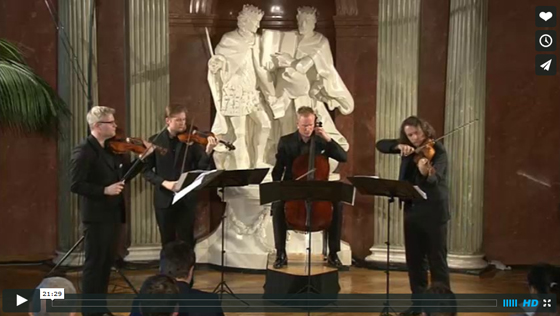
(2013)
Bregenz Festival
The 2nd of the "Music and Poetry" concerts for the 2013 Bregenz
Festival featured the Meccorre String Quartet (website).
Their program included the playing of André's 2nd String Quartet.
Members for this concert were Michal Bryla viola, Karol Marianowski
cello, Wojciech Koprowski violin, and Magdalena
Makowska violin.
(2004)
Camerata Quartet
The 2004 performace is by the Camerata Quartet (Kwartet Camerata in
Polish). The occasion was the 7th Polish Radio Music Festival and the
performance was in the Polish Radio Szymanowski Hall. Click
Here for their website in English, or Click
Here for their website in Polish.
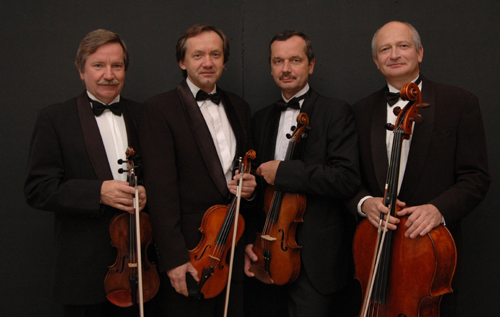
Wlodzimierz
Prominski - first violin, Andrzej Kordykiewicz - second violin,
Piotr Reichert - viola, Roman Hoffmann - cello
Complete
/ 00_op5_strng_qrt2_complete_2004.mp3
Sonata / 01_op5_strng_qrt2_1st_2004.mp3
Passacaglia / 02_op5_strng_qrt2_2nd_2004.mp3
Sonata da Capo / 03_op5_strng_qrt2_3rd_2004.mp3
Music/MP3
(1978)
The
following performance is the world premiere recording from January 23,
1978, which also appears on a Lindsay Quartet CD to celebrated their
25th anniversary. This CD is on the Academy Sound and Visions (ASV)
label, CD #DCA 825.
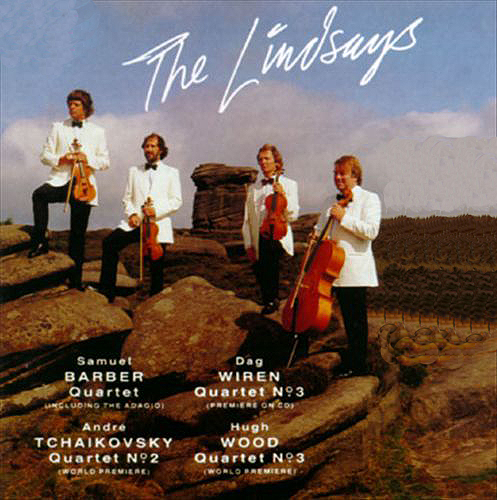
Peter
Cropper - First violin, Ronald Birks - Second violin,
Roger Bigley - viola, Bernard Gregor-Smith - cello
Introduction
/ 00_op5_introduction.mp3
Complete
/ op5_strng_qrt2_complete.mp3
Sonata
/ 01_op5_strng_qrt2_1st.mp3
Passacaglia
/ 02_op5_strng_qrt2_2nd.mp3
Sonata
da Capo / 03_op5_strng_qrt2_3rd.mp3
|
|
This
performance is on YouTube. Click
Here (opens new window) |
Annette
Morreau reviewed the Lindsay CD for BBC Music magazine:
To celebrate
their 25th anniversary, in a typically imaginative gesture, the Lindsay
String Quartet has brought out a CD of four 20th-century works, all
‘live’ performances. The works by André Tchaikowsky
and Hugh Wood (both written for the Lindsays and here in world premiere
recordings) are less of an easy listen. The Polish-born pianist and
composer André Tchaikowsky left only seven compositions when
he died tragically in 1982 at the age of 46. The elegiac Passacaglia
of this quartet brings full-blooded, passionate playing, a Lindsay
characteristic, while Hugh Wood’s third quartet, a gritty, complex
single movement brings out the Lindsays’ remarkable range of
instrumental colour, intensity of feeling and vigorous attack. A highly
welcome anniversary disc.
Peter Marchbank
reviewed this CD for Gramophone magazine:
The
disc reveals the wide musical interests of the Lindsay Quartet. While
their cycles of the quartets of Beethoven, Bartok and Tippett are well-known,
here — with the exception of the Adagio from Barber's Second Quartet
— they are playing music which is little-known but in which they
firmly believe.
Andre
Tchaikowsky's Second Quartet was recorded in 1978 when the composer
was still alive. Although better known as a fine concert-pianist,
his small output of compositions (there is, I know, a particularly
striking Piano Concerto) has attracted considerable critical attention.
His Second Quartet is a passionate and lyrical work in three movements
which are played without a break. The central Passacaglia is a wonderfully
haunting movement which reminds us not only of the composer's Polish
background but of his love for the music of Beethoven and Bartok.
Music
(2010)
A performance of the 2nd quartet took place on November 6, 2010 as part
of the 6th Krakow
Festival of Polish Music by the Meccore String Quartet.
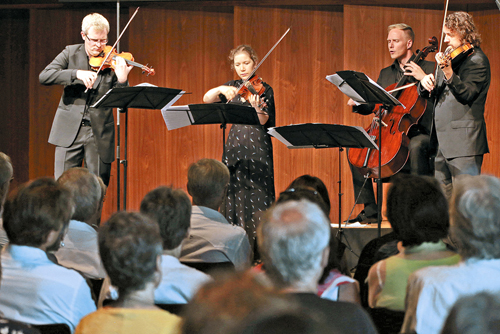
Wojciech Koprowski - first violin, Magdalena Makowska - second violin,
Michal Bryla - viola, and Karol Marianowski - cello [Photo 2013]
(For the Krakow performance, second violin was Aleksandra Tomasinska)
Of the
November 6, 2010 concert, Malgorzata Czech wrote for www.polskamuza.eu:
Andrzej
Czajkowski music was his fate - full of pain and loneliness. It is
also music very well thoughtout and composed with mathematical precision.
Polyphony is a dominant texture of this music of pain and loneliness,
which could tear apart the soul of the listener, plus it put enormous
technical requirements on the performers. Yesterdays monographic concert
at the Jagiellonian University’s Collegium Novum brought a level
of performance equal to the level of Andrzej Czajkowski's composing
skills - Masterful.
These
wonderful artists of the younger generation - Meccore String Quartet
- composed of Wojciech Koprowski (violin), Aleksandra Tomasinska (violin),
Michal Bryla (viola), and Karol Marianowski (cello) played the Second
Quartet String cleanly with precision and with perfect synchronization,
all within a mutual sense of spontaneity.
Music (2013)
A performance of the 2nd quartet took place on July 21, 2013 as part of
the 2013 Bregenz Festival Events featuring the compositions of André
Tchaikowsky. The
quartet was once again the Meccore String Quartet, as noted above.
Music
Publisher
This
work is
published by Josef
Weinberger and appears in their catalog of André Tchaikowsky
published works. Click Here
for a PDF copy of the André Tchaikowsky Weinberger catalog.
From
the biography The
Other Tchaikowsky
It took
André more than two years to write his String Quartet No. 2,
a work of about 20 minutes in performance. Eventually it was dedicated
to the Lindsay String Quartet, the excellent musicians who premiered
André's String Quartet No.1 (Opus 3); the initial dedication
was again to Stefan Askenase, this time for his 80th birthday (the String
Quartet No. 1 was dedicated to Stefan Askenase for his 75th birthday).
André wrote his own program notes for the Quartet No. 2:
In July
1971, the Lindsay Quartet gave the first performance of my first quartet
and immediately suggested I write another. I was flattered by the
request and eager to show my gratitude. But I could think of nothing
more to say in the medium and was afraid of repeating myself, so I
merely promised to think about it.
Some
months later, I heard the Lindsay Quartet play the Shostakovich sixth
quartet. The slow movement of that work is a simple and beautiful
passacaglia, a form I should never have dared to attempt in a string
quartet for fear of boring the ·cellist. Bernard Gregor-Smith
suggested a passacaglia with a varied bass, and this immediately helped
to focus my ideas. Even then, the cellist was still restricted to
going 'round in circles,' so I decided to compensate in the outer
movements by giving him conspicuous and flamboyant solos.
The next
logical step was to extend the concertante treatment to the other
players. This at once allayed my fears of producing an identical twin
of my first quartet, in which my chief aim had been a close knit truly
chamber texture, and I now relished all the display I had denied myself
before: high positions, single and double harmonics, quick alternations
or arcato and pizzicato, and so on. It was quite a surprise that,
with all of this, the new quartet is easier than the first.
Dynamically,
the work is shaped like a 'V.' The first movement is a rapid, tense
sonata, which calms down towards the end to set the mood for the somber
passacaglia. The last movement is a continuous accelerando. As its
speed increases, so does the resemblance to the first movement from
which it is derived.
To help
the Lindsay prepare for the performance, André went to their
location in Sheffield and assisted with the rehearsals. Only a few changes
to the Finale were required. Everything went well and André reported
to Halina Wahlmann-Janowska:
"I
didn't need to give the Lindsay any advice, as they understood the
piece perfectly well and only needed a bit more practice in a few
small places. The most pleasant thing is they like this new quartet
even more than the first one, although they liked that one too. I'm
curious to know the general reaction, although I'm not going to break
down if nobody goes along with the performers' opinion."
The Lindsay
gave the first performance of String Quartet No.2 at St. John's, Smith
Square, London, on January 23, 1978. The performance was broadcast by
the BBC. A critical review by Paul Griffiths in The Musical Times
included:
The Tchaikowsky
quartet is a work of intense passions forced into a symmetrical argument
around a passacaglia slow movement. Its style, situated somewhere
between the middle Bart6k quartets and Berg's Lyric Suite, sounds
genuine; the writing for string quartet is certainly so, with none
of the awkwardness or hesitancy one might expect of a pianist-composer.
But I find it difficult to warm to second-hand histrionics.
Another
review by Arthur Jacobs in The Daily Telegram:
For those
who, like myself, were as yet unacquainted with André Tchaikowsky
as a composer, yesterday's premiere of his Second String Quartet made
an agreeable impression. Here is a craftsmanlike composer able to
turn old forms to individual advantage.
Born
in Warsaw in 1935, Mr. Tchaikowsky has lived in this country since
1960, and has pursed an admired career as pianist. He is shortly to
give a solo recital in this same BBC Monday lunch-time series which
brought the Lindsay String Quartet to perform his new work. Their
command of the music and their sympathy with it were evident, and
Bernard Gregor-Smith's decisive 'cello solos were particularly eloquent.
The BBC
presentation was not so happy. Presumably some producer writes or
supervises the introductions before they are handed to an announcer
[Patricia Hughes] for that plummy-voiced, holier-than-thou delivery
which has rightly been ousted from almost all other radio and TV programmes.
The only two things necessary for the listener to know about Mr. Tchaikowsky's
quartet were its approximate length (20 minutes) and the fact that
its three movements are played without a break. Neither was announced,
and instead we had the inexactitude that the last movement was to
be 'a continuous accelerando.'
The three
movements follow a traditional sequence -- forthright, contemplative,
agitated. The middle one is a passacaglia (owing inspiration to Shostakovich's
Sixth Quartet, the composer says) which manages considerable intensity
and never lets the repeated bass pattern become tedious. The first
movement, thanks to strong internal contrasts, grips the ear immediately;
the finale speaks in a more wayward and recondite fashion, but entices
to further acquaintance.
The Lindsay
Quartet remembers:
"We
love André's quartets. We love the music, especially the second
quartet. It has some incredible textures and is very difficult music.
We would like to keep it in our repertoire, but it's not an easy prospect
as it takes a lot of work."
After only
a few performances, the Lindsay had to put the work aside in favor other
repertoire. Weinberger Ltd. published the quartet in 1980.
The Lindsay
Quartet also plays String Quartet No.1
(1973-1975) - Opus 3.
|
